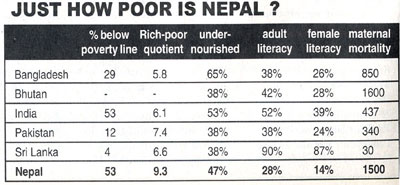The Human Development Report 2000 released last week shows that Nepal now ranks 144th among 174 countries. It is already at the bottom of the heap, even among South Asian countries.

An average Nepali lives for 57.8 years, 4.2 years less than the average South Asian. and Nepal is the only country in the world where men live longer than women-an indicator of serious gender disparities. Poor and disadvantaged groups and castes in Nepal live only an average of 46 years-a full 15 years less than the "upper castes\'.
The poorest 20 percent of Nepalis earn less than 8 percent of the total income. The richest 10 percent pocket almost 50 percent. Income disparities are widest in Nepal compared even to Pakistan and Bangladesh (see table).
The good news this year is that Nepal didn\'t fall any further down the ladder, and our human development index-a measurement of average lifespan, education, and living standards-improved slightly.
Looking back over the past 30 years, Nepal has made remarkable progress. But it needs to take giant leaps if it is serious about making a dent on poverty. According to the United Nations Development Programme (UNDP), the most encouraging thing for the country\'s planners is that we now know how to do it: development is inextricably linked with devolution.
"Nepal\'s progress has been very rapid, but it doesn\'t mean anything if human poverty is still so widespread, Big things need to be done," says Saraswathi Menon at UNDP in Kathmandu.
The most effective war to fight poverty is to make democracy work at the grassroots and let the people demand development."
The provisions of the decentralisation laws In Nepal are exceptionally advanced compared to other South Asian countries.
The Decentralisation Act (1932) and the Local Self-Governance Act (1999) are radical pieces of legislation and contain the provisions necessary to make grassroots democracy deliver basic health, education and other services.
So what is holding things up? Why isn\'t the standard of living of Nepalis improving? Most development experts blame Kathmandu\'s reluctance to let go. Speeches by ministers extolling the virtues of decentralisation are usually just lip service-the line ministries do not really want their budgets eroded, the tax department feels local collection would hurt national revenue.
"So far, decentralisation exists mostly on paper," says Krishna Prasad Sapkota, president of the Association of District Development Committees of Nepal. \'We have a centralised mentality, we lave to first get over that."
If properly implemented the acts would allow people to make decisions about basic health care, education, roads, bridges, agriculture and employment and even pay partly for them from locally generated revenue.
"The bosses in Kathmandu don\'t want to give away their economic.
political and administrative authority. Elected local bodies are more accountable to the people and they are more transparent in their functions," says Sapkota. "In many ways there was probably more real decentralisation in Panchayat times.
The main problem is that older laws clash with provisions in the Local Self-Governance Act. For example, existing laws give line agencies responsibility for health and education at the district level whereas the 1999 legislation puts the onus on local elected bodies.
If not amended to comply with the newer legislation, these laws could force local bodies to keep on functioning at the command or discretion of the Centre.
"Decentralisation is the great hope for Nepal," says UNDP\'s Menon. "But for decentralisation to happen, the centre has to re-invent itself."
At the Local Development Ministry, Uday Raj Soti says the government is "hundred percent positive" about amending the contradictory provisions. He adds:\'
"But we need time for the amendment procedures to be completed. We can only request the line ministries to act promptly on the amendments, but we can\'t pressurise them.
Critics of rapid decentralisation, however, argue that district-level management, auditing and tax collection capabilities have to be upgraded before budget and tax collection are devolved. UNDP, the German agency GTZ, Norway\'s NORAD, the Dutch SNV are all using decentralisation for development projects in rural Nepal and will soon be working in all 75 districts.
Sanjay Adhikari, of LNDP\'s Participatory District Development Programme, sees a shift in the government\'s thinking and allocation of funds to local bodies. "It has been a gradual process, but we see elected groups at the district and village level becoming increasingly capable, and asserting their decision-making authority."
 "The power in the Centre has been wielded by a small closely-knit group. They are afraid to let control go to others," says sociologist Krishna Bahadur Bhactachan.
"The power in the Centre has been wielded by a small closely-knit group. They are afraid to let control go to others," says sociologist Krishna Bahadur Bhactachan. "The Centre treats local bodies like puppets without letting them have autonomy. The government cannot think of building their capabilities and bringing the fruits of development to the people\'s level without devolving power."


